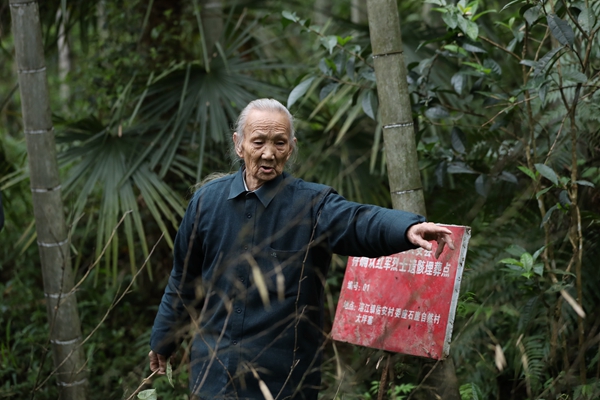'Mother of the graves' devotes her life to army of fallen heroes


For four decades, Xu Zhaoying carried out a mission of compassion. At a sprightly 84, she insisted on climbing the hills behind her house to tend to the graves of martyrs of the Red Army in Xing'an county of Guilin in South China's Guangxi Zhuang autonomous region.
Geographically isolated from urban areas, You'an village, Xu's hometown, can only be reached after a two-hour drive deep into the mountain.
With few neighbors and little arable land to farm, she lived a humble life but refused to move although her son asked her to many times.
To some people, living near graves can be the stuff of nightmares, but Xu feels the proximity provides comfort.
A batch of Red Army soldiers, heavily outnumbered, sacrificed their lives in Xing'an in the Battle of the Xiangjiang River during the Long March, a strategic retreat from 1934-36.
Hundreds of heroes lost their lives here due to the overwhelming numbers of the Kuomintang army.
At that time, it was forbidden for local farmers to offer any help to the Red Army. Otherwise, they would be punished by the Kuomintang army.
However, local farmers believed the Red Army was highly disciplined and strived to improve the lives of the people.
It was dangerous for local farmers to offer food, deliver materials to the Red Army, or even help them escape.
Xu's father was one of the farmers who risked their lives to save injured soldiers and built tombs for the dead in a bamboo forest.
"The battle then was so fierce that the Red Army suffered great losses. My father buried the martyrs on the hills secretly and took us to sweep their tombs every year," says Xu.
Xu's father couldn't figure out the identity of the martyrs.
To Xu's pride, her father never gave in even when he was threatened with death for his courage and sympathy.
"From my father's behavior, I learned at an early age that the Red Army was fighting for us so that the people can change their own fate. In my eyes, they are uncles and brothers," she says.
After Xu's father passed away, Xu and her mother decided to build a house around the tombs in 1981 to make sure these unknown heroes would be remembered.
Xu never left the house even after she got married.
"My mother didn't receive any education when she was young because of poverty, but she has a firm faith and encourages us to stay strong in life," says Xu Shanhui, son of Xu Zhaoying.
The elderly woman lived alone for years after her husband passed away and her children started new lives outside.
Her son asked and pleaded with Xu to move downtown with him or near him to enjoy a better life. But the "mother of the graves" remains adamant."It is impossible for me to leave the heroes behind," she says."As long as I can breathe, I will keep them company."
In recent years, the local government has attached great importance to the settlement of martyrs' remains and has built a memorial park. Besides, the government also helped renovate the tombs behind Xu's house.
According to the local officials, Xu is quite independent and never receives any financial help from the government even though the impoverished family has experienced hardships.
"Just think about how the Red Army had suffered, and see what a great victory we have today. The spirit of the Red Army should never be forgotten and it will inspire our offspring," Xu says.




































